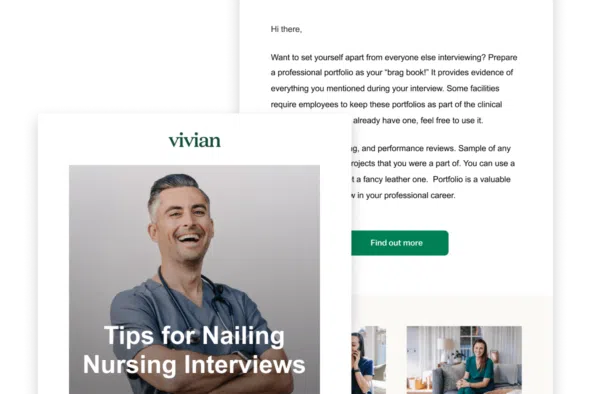You’ve found the perfect nursing job for your next career move, applied and landed an interview. Now comes the challenging part – convincing the interviewer that you’re the best candidate for the position. Even the most experienced healthcare providers may flounder when asked certain nursing interview questions. To better prepare for an upcoming job interview, explore Part 1 of our series on nursing job interviews for 10 commonly asked questions, coupled with tips on how to respond.
What Interviewers Want to Hear
Interviewers need you to convince them that you’re the best fit for the open nursing position in their unit. They look for thoughtful answers about your nursing experience and use your responses to make this determination. So, what do they want to hear and how can you make sure you’re ready to deliver?
Before we dive into actual questions, let’s start by looking at some subject matter typically found within nursing interview questions. Interviewers invariably touch on issues such as patient care, adaptability and teamwork. However, healthcare employers often lean toward behavioral-based questions to learn how you’ve previously performed in specific situations.
Try to utilize real-life examples of situations you’ve personally experienced, especially when answering behavioral-based questions. To keep your answers concise and on point, briefly outline the situation, task, action taken and result. This tactic is known as the STAR format. Keep these tips in mind when contemplating how you’d answer these questions.
10 Nursing Interview Questions and How to Answer
1. Why did you become a nurse?
Alternatives to this question might be, “Why did you choose nursing as a career?”, “What led you to go into nursing?” or something similar. Interviewers will look for various elements in your responses, such as a passion for nursing, enthusiasm for providing patient care and a desire to learn new skills and contribute to your community and healthcare as a whole.
Common answers include a desire to help people or make a difference in people’s lives and/or healthcare. While there’s nothing wrong with these answers, and likely true for most, if not all nurses, try to add more detail to stand out.
Maybe a nurse become a role model while you were young when you, a sibling or a parent had a serious illness or injury. Perhaps healthcare runs in the family and you’ve always admired your mother, father, sister, brother or another relative who’s a doctor, nurse, or therapist, and this admiration inspired you to follow in their footsteps. Maybe a personal experience spiked your interest in a particular nursing specialty, such as helping premature infants in a NICU or supporting patients struggling with mental health. Try to give a specific reason that drew you to the profession.
2. What can you tell me about your background?
This question may seem redundant since the interviewer has likely already seen your resume and may even have it sitting right in front of them. However, you may not have everything you’ve done on your resume, especially if you stuck to a single concise page (which is no longer the norm).
Interviewers are looking for a brief run-down of your work history to see if anything was missing from your resume and determine how your experience prepared you for the role they’re trying to fill. This question gives you the opportunity to connect your skills with your experience to hopefully lead straight to what qualifies you for this job. Try to include details that demonstrate your adaptability, patient care abilities and teamwork skills.
RELATED: How to Build a Winning Resume: A Webinar
3. Why do you want this position/want to work at this healthcare facility?
Interviewers may follow up the question on why you became a nurse with why you want this position and/or want to work at their healthcare facility. Part of the goal of this question is to learn how much a candidate knows about the facility or determine if they just applied for the stellar pay package.
To stand out among other nursing candidates, do your homework so you’re prepared to answer this question. Armed with some background information about the facility, put some thought into your answer. Does the facility’s mission resonate with your own values? Does the position offer ways to expand your nursing practice and/or further your career? Have you heard good things about the unit you’re applying to and want to be part of a unit with a high quality of care? Formulating your answer to this question prepares you for your interview and helps confirm whether you really want this job.
4. What qualifications and experience do you have that make you the best candidate for this job?
This question is one of potentially several that can be challenging because you want to brag about yourself without making yourself sound overly conceited. Focus on your relevant work history and training that have provided you with the experience and skills you need to do this job well rather than personality traits.
The interviewer wants to make sure you understand what the nursing role entails and that you have the skills to meet the requirements. Always try to connect your previous experience directly to the demands of the position. Don’t just list all your qualifications on your resume. Describe experiences that provided you with the skills to perform the job and examples that illustrate why you’re the best nurse for the position.
5. What are your strengths in practice?
Before your nursing interview, prepare a list of your strengths. Identify the strengths pertinent to the job you’re interviewing for so you can focus on those when answering this question. Again, try to tie your strengths to your experiences on the job. If you’ve previously worked in an emergency department, use that experience as an example of your ability to multitask, remain calm under pressure and function in a fast-paced, high-stress environment.
The interviewer uses your answer to determine whether you’re self-aware and if your opinion of yourself aligns with their opinion of you. They can also use this question to learn even more about any nursing skills you haven’t discussed yet. This question is another one where you must be careful to demonstrate that you have pride in what you do well without sounding arrogant.
6. Do you lack any experience or have weaknesses in an area that may hinder your ability to perform this job efficiently?
This question is the flipside to the previous one, with the interviewer trying to determine if you’re honest and confident enough to admit you have weaknesses. It’s also a tough one to answer. You don’t want to appear unsure of any of your skills, but again, you don’t want to sound arrogant by saying you don’t have any weaknesses.
The trick to this question is to formulate your response so you’re not admitting to weakness but rather an area in which you have room to improve. Be open and acknowledge an area where you could grow your skills, but don’t choose an area that directly impacts a skill you need to perform this job efficiently.
For example, if you’re not bilingual, you might say your lack of bilingual skills could be considered a weakness. But you consider it an opportunity for improvement that could help you better serve patients and/or family members who speak this language. Your interviewer will likely be more impressed with your honesty than if you give them a cliché answer such as I work too hard.
7. What would you do if a patient’s family criticized your care services?
Nursing frequently involves some interpersonal challenge and those between a patient’s family aren’t unusual. This question aims to see how you react to this criticism and handle the challenge. Family members are stressed when a loved one is sick or injured and want to ensure they’re receiving the very best care. Nurses are with patients more than any other healthcare professional, so they typically get the brunt of any criticism regarding care.
Experienced nurses know how to respond to family concerns by actively listening to their complaints and effectively communicating the reason for their care strategies. This question offers an ideal way to explain a personal experience of how you dealt with a patient’s family (without violating HIPAA) and alleviated their concerns. The interviewer is looking at your interpersonal and communication skills while determining whether you were confident in your care techniques and kept the patient’s care as the priority.
8. How would you manage an uncooperative patient?
Flipping from disgruntled family members to an uncooperative patient, this question gives the interviewer an idea of how well you work under pressure. Again, explain an actual situation without violating HIPAA and how you handled the situation while providing exceptional care to the patient. When describing the situation, don’t talk negatively about the patient.
While nurses must always do what’s best for the patient, even if the patient doesn’t agree, they must still show compassion and empathy when handling difficult situations. While recounting the situation, demonstrate how you used your problem-solving, critical thinking and conflict-resolution skills to defuse the situation while ensuring patient safety and satisfaction.
9. Consider a time you and a colleague differed in opinions and how you resolved it.
In the same vein as interpersonal conflict with patients’ families and handling uncooperative patients, is some form of question concerning a dispute with a co-worker. Never badmouth a colleague during an interview. With this line of questioning, the interviewer is trying to determine how well you dealt with a difficult co-worker or if you were the difficult co-worker.
If you’re explaining a situation with a fellow nurse or another co-worker, make sure to convey that you remained respectful throughout the encounter. Provide details on the difference of opinion or why the individual was difficult, then share how you handled the situation.
However, try to turn anything negative into a positive by including what you learned from the experience. If the situation required escalation to a supervisor, demonstrate that you understand how to use the chain of command when two co-workers can’t resolve a difference. If the situation involved a patient’s safety, be sure to convey that you were advocating for your patient.
10. Tell me about your greatest accomplishment.
If you can relate your answer to this question to the nursing job you’re applying for, that’s great! Either way, this gives you a final opportunity to brag about yourself a little bit. But, again, take care not to go overboard. Finding an ideal balance between seeming like a know-it-all and just being an extraordinary nurse who loves their job can be challenging.
You may also answer that becoming a nurse is your greatest accomplishment. This answer is always a great one. However, be prepared to discuss why you feel this is your greatest accomplishment and why nursing has been such a success for you.
You can also opt to share an achievement unrelated to nursing if you feel it’s your greatest accomplishment. It’s perfectly fine to go this route but try to relate it to the nursing profession in some way. It could be as simple as connecting your non-nursing achievement to your compassion or people skills. Both of which serve you well in nursing.
Prepare for Success
Besides practicing how you’d answer these nursing interview questions, the best thing you can do to help ensure your success is to be prepared. Do as much research about the facility, unit and position before the interview. If you’re asked to complete a video interview, treat it like an in-person interview. Remember to never talk badly about anyone, whether it’s a patient, patient’s family member, co-worker, physician or former supervisor. Focus on what you do well without putting others down.
Explore more tips for nailing your nursing interview on Vivian to help you land the job you want, and check out the second part of our series, How to Answer Common Nursing Interview Questions: Part 2, for insights into 10 additional questions you might be asked and tips on how to answer them.






